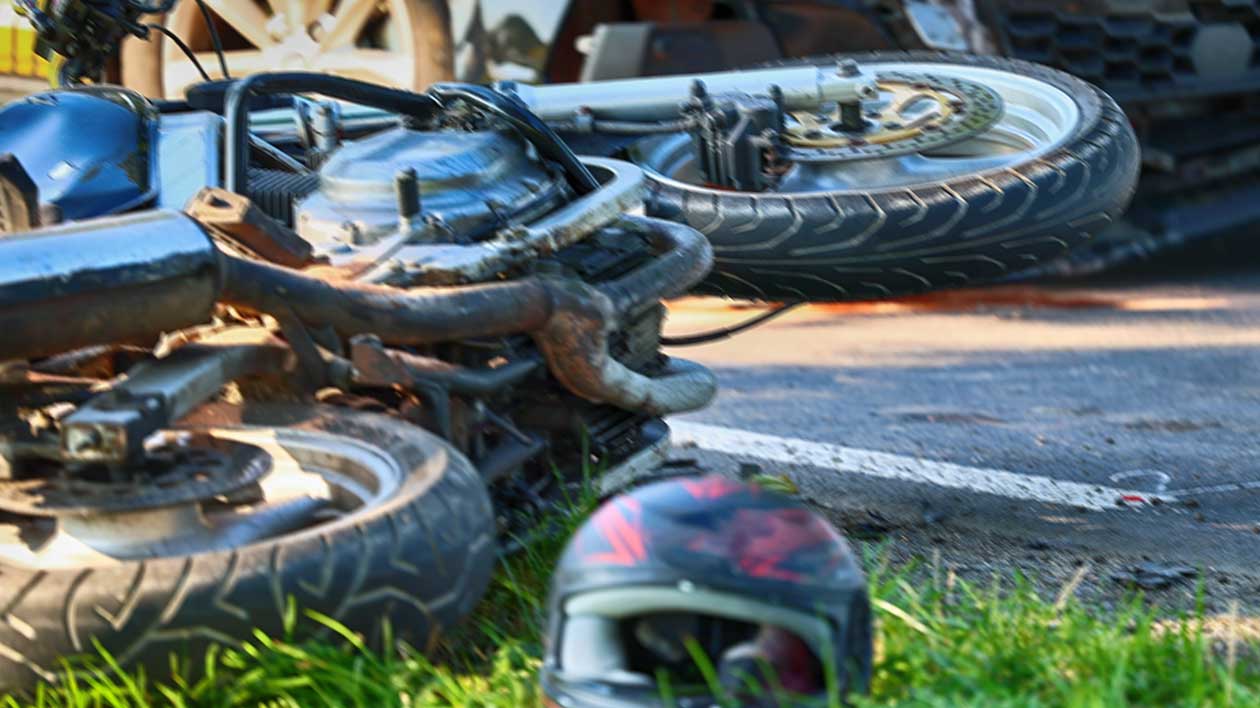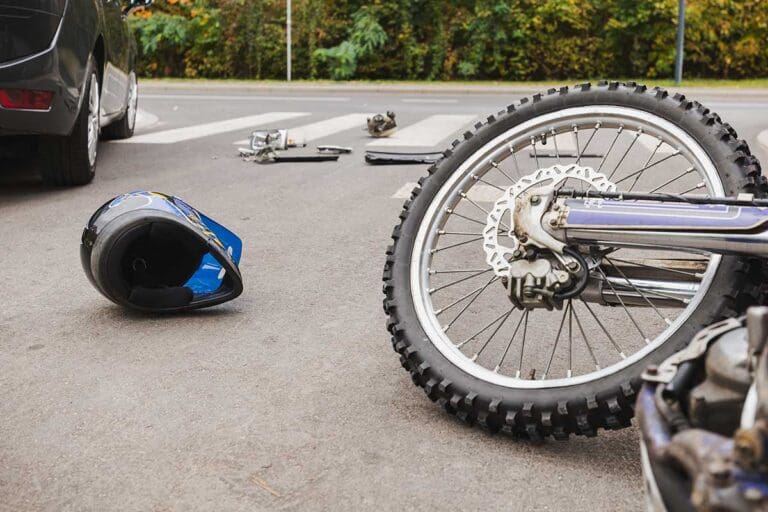Key Takeaways
Motorcyclists face a higher risk of severe injuries due to limited protection compared to passenger vehicles.
Common causes of motorcycle accidents include distracted drivers, left-turn collisions, road hazards, and speeding.
Injuries in motorcycle accidents are often catastrophic, including traumatic brain injuries, spinal cord damage, and amputations.
Motorcycle accident cases can be complex, as bias against riders may affect liability determinations.
A personal injury attorney can help victims secure fair compensation for medical expenses, lost income, and long-term suffering.
The Reality of Motorcycle Accidents
Riding a motorcycle offers an unparalleled sense of freedom, but it also comes with significant risks. Motorcyclists are 29 times more likely to be killed in an accident than passengers in cars, according to the National Highway Traffic Safety Administration (NHTSA). Unlike enclosed vehicles, motorcycles provide little to no protection in a crash, making injuries far more severe.
Motorcycle accident victims often face long hospital stays, rehabilitation, and a painful road to recovery. In many cases, these injuries prevent riders from returning to work or even living independently. On top of that, there is often a bias against motorcyclists, with insurance companies and negligent drivers blaming them unfairly. If you or a loved one has been injured in a motorcycle accident, it’s critical to understand your legal rights and ensure you don’t have to bear the financial burden alone.
Common Causes of Motorcycle Accidents
Motorcycle accidents often occur due to negligence by other drivers, unsafe road conditions, or mechanical failures. Understanding these causes can help determine who is at fault and strengthen your case.
1. Distracted Driving
- Drivers texting, eating, or adjusting in-car systems often fail to notice motorcycles until it’s too late.
- Left-turn accidents are a major risk, as drivers frequently misjudge a motorcycle’s speed.
2. Failure to Yield & Left-Turn Collisions
- Many motorcycle accidents occur at intersections when cars turn left into oncoming riders.
- Drivers often claim they “didn’t see the motorcycle”, but this doesn’t excuse negligence.
3. Speeding & Reckless Driving
- Excessive speed reduces reaction time and increases crash severity.
- Some drivers cut off motorcycles or tailgate, creating dangerous situations.
4. Road Hazards & Poor Infrastructure
- Potholes, debris, uneven pavement, and lack of proper signage disproportionately affect motorcyclists.
- Poorly maintained roads can cause riders to lose control, leading to devastating injuries.
5. Dooring Accidents
- A driver opens a car door into a passing motorcycle, causing the rider to crash.
- This is especially common in urban areas with heavy traffic and parked cars.
6. Impaired Driving
- Drunk or drug-impaired drivers have reduced reaction times and fail to recognize motorcycles.
- Driving under the influence is a major cause of fatal motorcycle crashes.
Common Injuries in Motorcycle Accidents
Because motorcycles provide little protection in a crash, injuries are often severe and life-altering. Many riders require extensive medical treatment, surgeries, and rehabilitation.
- Traumatic Brain Injuries (TBI): Even with helmets, head trauma can lead to permanent cognitive and physical impairments.
- Spinal Cord Injuries & Paralysis: Many riders suffer partial or total paralysis, requiring lifelong medical care.
- Fractures & Broken Bones: Riders often suffer multiple fractures, requiring surgeries and long recovery times.
- Road Rash & Skin Abrasions: When a rider is thrown from their motorcycle, they may suffer severe abrasions and infections.
- Internal Injuries: Damage to organs, internal bleeding, and punctured lungs can be life-threatening.
- Amputations: Crashes involving trucks or high speeds may result in lost limbs.
The financial and emotional toll of these injuries can be overwhelming, making legal action essential to securing the support you need.
What to Do After a Motorcycle Accident
If you’ve been involved in a motorcycle accident, taking the right steps can protect your health and strengthen your legal claim.
1. Seek Immediate Medical Attention
- Some injuries, like internal bleeding or concussions, don’t show symptoms right away.
- Follow all medical advice and keep records of treatments and diagnoses.
2. Call the Police & File a Report
- A police report documents the crash and can help prove liability.
- Do not let the other driver talk you out of filing an official report.
3. Gather Evidence
- Take photos of the accident scene, your injuries, road conditions, and vehicle damage.
- Get contact information from witnesses who can support your version of events.
4. Avoid Admitting Fault
Even saying “I’m okay” can be used against you later. Stick to the facts when speaking to police or insurance companies.
5. Consult a Personal Injury Attorney
- Motorcycle accident cases are complex, and insurance companies often try to place blame on riders.
- An attorney ensures you receive full and fair compensation for your injuries.
Who is Liable in a Motorcycle Accident?
Motorcycle accident liability depends on the specific circumstances of the crash. Responsible parties may include:
- The Other Driver – If they were speeding, distracted, impaired, or failed to yield.
- The Motorcycle Manufacturer – If defective brakes, tires, or steering components caused the crash.
- A Government Entity – If potholes, missing road signs, or poor infrastructure contributed to the accident.
- Commercial Trucking Companies – If a delivery truck, semi-truck, or work vehicle caused the crash.
An experienced attorney will investigate your accident to identify all liable parties and hold them accountable.
Compensation for Motorcycle Accident Victims
Motorcycle accident victims may be entitled to substantial compensation, including:
- Medical Expenses: Emergency care, hospital bills, rehabilitation, and future medical needs.
- Lost Wages & Future Earning Potential: Compensation for time off work and permanent disability.
- Pain and Suffering: Emotional distress, PTSD, and loss of enjoyment of life.
- Property Damage: Repairs or replacement of the motorcycle.
- Disability & Home Modifications: If permanent injuries require wheelchairs, prosthetics, or home adjustments.
- Wrongful Death Damages: Funeral costs, loss of income, and emotional suffering for families of deceased victims.
Insurance companies often try to offer low settlements, but a lawyer can fight for the compensation you truly deserve.
Why You Need a Personal Injury Attorney
Motorcycle accident claims can be challenging due to bias against riders, complex insurance negotiations, and serious long-term injuries. A personal injury attorney can:
- Prove Liability: Conduct investigations, gather evidence, and reconstruct the accident.
- Negotiate with Insurance Companies: Fight against low settlement offers and hold negligent parties accountable.
- Ensure Full Compensation: Secure damages for medical expenses, lost income, and long-term care.
- Take Your Case to Trial: If necessary, an attorney can fight in court for the justice you deserve.
Motorcycle accidents can change lives in an instant. If you or a loved one has been injured in a crash, you should not have to bear the financial and emotional burden alone. Negligent drivers, defective roadways, and reckless motorists must be held accountable.



